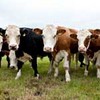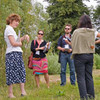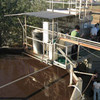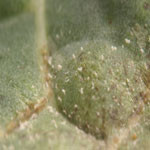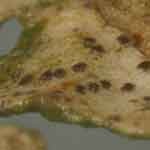Rothamsted Research has updated its oilseed rape online disease risk forecasts for light leaf spot and phoma leaf spot for the 2013/14 growing season.
They suggest that although the risk prediction is lower than in recent years, disease pressure will be high due to the crop situation in the field. The warm, dry summer has slowed the development of fruiting bodies of both the light leaf spot fungus and the phoma leaf spot fungus resulting in a reduced prediction of severity of light leaf spot in spring and a mid to late onset of the phoma epidemic. However, the long drawn out harvest has affected sowing of the new season’s crop so that there are effectively two types of oilseed rape crop in the field.
Early sown crops, now well established with fairly large plants (5-10 leaves) are at risk from light leaf spot but should escape phoma. Late sown crops with either very small plants or struggling to emerge will have missed the onset of light leaf spot but will be at risk from phoma infection, according to Weather Innovations plant pathologist Dr Neal Evans.
“As we all know, it’s been a strange year for many reasons” he says, “The late harvest has created a unique situation with effectively two different types of oilseed rape crop, each with their own issues with respect to disease. Due to the polycyclic nature of light leaf spot, early sown crops are inherently at greater risk of this disease. However, the warm dry weather we encountered in August and September means that Phoma ascospores are only being released now, so these early crops have probably escaped the worst of the phoma epidemic. In contrast, late sown, backward crops have probably missed the worst of the light leaf spot epidemic, but will be vulnerable to infection from the current flush of phoma spores. There is a real need for extra vigilance this year.”
For more details, visit the Rothamsted forecast websites at http://www.rothamsted.ac.uk/light-leaf-spot-forecast for light leaf spot and http://www.rothamsted.ac.uk/phoma-leaf-spot-forecast for phoma.
The forecast updates were done in association with Weather INNovations Consulting LP with support from HGCA and Bayer CropScience Ltd:


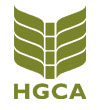

Contacts
Weather INnovations Incorporated (WIN) - www.weatherinnovations.com
WIN specializes in providing turnkey weather based monitoring and modelling solutions for agribusinesses, producer organizations, government agencies, researchers and others. WIN makes models easy to use at the farm level by providing a connection to innovative research with site-specific applications.Rory Sweeting, Communications & Marketing Co-ordinator – + 1 519-352-5334 ext. 228
rsweeting@weatherinnovations.com



